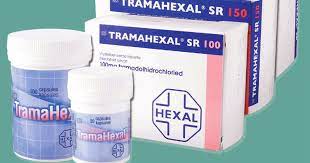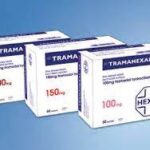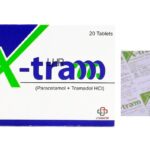Tramahexal: Uses, Dosage, Side Effects, Addiction

What is Tramahexal?
Tramahexal is a brand of tramadol, a prescription drug that works by binding to opioid receptors in the brain, which relieves pain. Tramahexal belongs to a class of drugs called opioid agonists. A class of drugs is a group of medications that work in a similar way. These drugs are often used to treat similar conditions. Although it is effective at treating mild to moderate acute or chronic pain, tramadol is one of the least potent painkillers available.
However, Tramahexal can still be addictive, especially when taken for a long period of time or when taken in larger doses than prescribed. Tramahexal is a controlled substance. This means it can only be used with a doctor’s close supervision.
What is Tramahexal used for?
Tramahexal is used to treat moderate to severe pain. Tramahexal may be used as part of a combination therapy. This means you may need to take it with other medications. Tramahexal belongs to a class of drugs called opioid agonists. A class of drugs is a group of medications that work in a similar way. These drugs are often used to treat similar conditions.
How should Tramahexal be used?
Tramahexal is usually used with or without food every 4 to 6 hours as needed. Take Tramahexal exactly as directed. Take the extended-release Tramahexal at about the same time of day every day. If you are taking the extended-release, you may take it with or without food. If you are taking the extended-release, you should either always take it with food or always take it without food. Do not take more medication as a single dose or take more doses per day than prescribed by your doctor. Taking more Tramahexal than prescribed by your doctor or in a way that is not recommended may cause serious side effects or death.
Your doctor may start you on a low dose of Tramahexal and gradually increase the amount of medication you take, not more often than every 3 days if you are taking the regular tablets.
Do not stop taking Tramahexal without talking to your doctor. Your doctor will probably decrease your dose gradually. If you suddenly stop taking Tramahexal, you may experience withdrawal symptoms such as nervousness; panic; sweating; difficulty falling asleep or staying asleep; runny nose, sneezing, or cough; pain; hair standing on end; chills; nausea; uncontrollable shaking of a part of your body; diarrhea; or rarely, hallucinations (seeing things or hearing voices that do not exist).
What are the side effects of Tramahexal?
Tramahexal oral tablet may cause drowsiness. You should not drive, use heavy machinery, or perform any dangerous activities until you know how this drug affects you. Tramahexal may also cause other side effects.
The more common side effects of Tramahexal can include:
- dizziness
- headache
- drowsiness
- nausea and vomiting
- constipation
- lack of energy
- sweating
- dry mouth
- itching
If these effects are mild, they may go away within a few days or a couple of weeks. If they’re more severe or don’t go away, talk to your doctor or pharmacist.
Serious Side Effects Of Tramahexal
Call your doctor right away if you have serious side effects. Call 911 if your symptoms feel life-threatening or if you think you’re having a medical emergency. Serious side effects and their symptoms can include the following:
- Serotonin syndrome. Symptoms can include:
- fast heart rate
- high blood pressure
- body temperature that’s higher than normal
- reflexes that are stronger than normal
- lack of coordination (control of your movements)
- nausea and vomiting
- diarrhea
- agitation
- hallucinations (seeing or hearing things that aren’t real)
- coma
- Serious breathing problems. Symptoms can include:
- slowed breathing rate
- very shallow breathing (little chest movement with breathing)
- fainting, dizziness, or confusion
- Physical dependence and withdrawal when stopping the drug. Symptoms can include:
- feeling irritable, anxious, or restless
- trouble sleeping
- increased blood pressure
- fast breathing rate
- fast heart rate
- dilated (large) pupils
- teary eyes
- runny nose
- yawning
- nausea, vomiting, and a loss of appetite
- diarrhea and stomach cramps
- sweating
- chills
- muscle aches, back pain, or joint pain
- Adrenal insufficiency. Symptoms can include:
- long-lasting tiredness
- muscle weakness
- pain in your abdomen
- Androgen deficiency. Symptoms can include:
- tiredness
- trouble sleeping
- decreased energy
- Seizures
- Addiction or misuse of this drug
What medications interact with Tramahexal?
Tramahexal can interact with other medications, vitamins, or herbs you may be taking. An interaction is when a substance changes the way a drug works. This can be harmful or prevent the drug from working well.
To help avoid interactions, your doctor should manage all of your medications carefully. Be sure to tell your doctor about all medications, vitamins, or herbs you’re taking. To find out how this drug might interact with something else you’re taking, talk to your doctor or pharmacist.
Examples of drugs that can cause interactions with tramadol are listed below.
Drugs you should not use with Tramahexal
Do not take these drugs with Tramahexal. Doing so can cause dangerous effects in the body. Examples of these drugs include:
- Carbamazepine. Taking this medication with tramadol may make tramadol less effective in relieving your pain. It also decreases the amount of tramadol in your body and increases your risk of seizures.
Interactions that increase your risk of side effects from other drugs
Taking Tramahexal with certain medications raises your risk of side effects from those drugs. This is because the amount of those drugs in your body may be increased. Examples of these drugs include:
- Depression drugs, such as sertraline, fluoxetine, paroxetine, citalopram, escitalopram, duloxetine, or venlafaxine
- You may have increased levels of serotonin (a hormone in your body). This can cause a condition called serotonin syndrome. Symptoms can include feeling agitated or restless, a fast heartbeat, increased body temperature, nausea, or vomiting.
- If you take one of these drugs with tramadol, your doctor may monitor you more often and adjust your dosage of the drug as needed.
- Monoamine oxidase inhibitors (MAOIs), including isocarboxazid, phenelzine, or selegiline
- You may have increased levels of serotonin (a hormone in your body). This can cause a condition called serotonin syndrome. Symptoms can include feeling agitated or restless, a fast heartbeat, increased body temperature, nausea, or vomiting.
- If you take one of these drugs with tramadol, your doctor may monitor you more often and adjust your dosage of the drug as needed.
- Linezolid
- You may have increased levels of serotonin (a hormone in your body). This can cause a condition called serotonin syndrome. Symptoms can include feeling agitated or restless, a fast heartbeat, increased body temperature, nausea, or vomiting.
- If you take this drug with tramadol, your doctor may monitor you more often. They may also adjust your dosage of tramadol as needed.
- Lithium
- You may have increased levels of serotonin (a hormone in your body). This can cause a condition called serotonin syndrome. Symptoms can include feeling agitated or restless, a fast heartbeat, increased body temperature, nausea, or vomiting.
- If you take this drug with tramadol, your doctor may monitor you more often. If you have symptoms of serotonin syndrome, your doctor may switch you to a different drug that doesn’t interact with tramadol.
- St. John’s wort
- You may have increased levels of serotonin (a hormone in your body). This can cause a condition called serotonin syndrome. Symptoms can include feeling agitated or restless, a fast heartbeat, increased body temperature, nausea, or vomiting.
- If you take this drug with tramadol, your doctor may monitor you more often and adjust your dosage of St. John’s wort as needed.
- Headache drugs, such as sumatriptan, rizatriptan, or zolmitriptan
- You may have increased levels of serotonin (a hormone in your body). This can cause a condition called serotonin syndrome. Symptoms can include feeling agitated or restless, a fast heartbeat, increased body temperature, nausea, or vomiting.
- If you take one of these drugs with tramadol, your doctor may monitor you more often and adjust your dosage of the drug as needed.
- Hypnotics, such as zolpidem
- You may have slowed breathing, decreased blood pressure, a decreased heart rate, or confusion.
- If you take one of these drugs, talk with your doctor about whether tramadol is safe for you. Your doctor may prescribe a lower dosage of the hypnotic for you.
- Benzodiazepines, such as alprazolam, clonazepam, diazepam, or lorazepam
- You will be at increased risk of confusion, slowed or stopped breathing, decreased blood pressure, a decreased heart rate, coma, or death.
- If you take one of these drugs, talk with your doctor about whether tramadol is safe for you. Your doctor may prescribe a lower dosage of the benzodiazepine drug for you.
- Anti-psychotic drugs, such as chlorpromazine or thioridazine
- You may have slowed breathing, decreased blood pressure, a decreased heart rate, or confusion.
- If you take one of these drugs, talk with your doctor about whether tramadol is safe for you. Your doctor may prescribe a lower dosage of the antipsychotic drug for you.
- Anesthesia drugs, such as succinylcholine, pentothal, or propofol
- You may have slowed breathing, decreased blood pressure, a decreased heart rate, or confusion.
- If you take one of these drugs, talk with your doctor about whether tramadol is safe for you. Your doctor may prescribe a lower dosage of the anesthesia drug for you.
- Opioid drugs for pain, such as hydrocodone, oxycodone, or morphine
- You will be at increased risk of confusion, slowed or stopped breathing, decreased blood pressure, a decreased heart rate, coma, or death.
- If you take one of these drugs, talk with your doctor about whether tramadol is safe for you. Your doctor may prescribe a lower dosage of either tramadol or the other opioid drug.
- Digoxin
- If you take this drug with tramadol, your doctor may monitor the amount of digoxin in your body.
- Warfarin
- If you take this drug with tramadol, your doctor may monitor the amount of warfarin in your body and your INR (international normalized ratio) more often. They may also adjust your warfarin dosage as needed.
This drug comes with several other warnings.
Seizures warning
Tramahexal can cause or worsen seizures. Your risk of seizures is higher if you’re taking other certain medications. These drugs include other opioid pain drugs or certain medications for depression, other mood disorders, or psychosis. If you take too much tramadol, you may be treated with a medication called naloxone. This drug also raises your risk of seizures.
Allergy warning
Tramahexal can cause a severe allergic reaction. Symptoms can include:
- trouble breathing
- swelling of your face, lips, throat, or tongue
- severe itching
- hives (itchy welts)
- blistering or peeling skin
If you have an allergic reaction, call your doctor or local poison control center right away. If your symptoms are severe, call 911 or go to the nearest emergency room.
Don’t take this drug again if you’ve ever had an allergic reaction to it or other opioids before. Taking it again could be fatal (cause death).
Alcohol interaction
The use of drinks that contain alcohol can increase your risk of certain side effects from tramadol. These include slowed breathing, decreased heart rate, decreased blood pressure, or confusion. You should not drink alcohol while taking tramadol.
FDA warnings
- This drug has several boxed warnings. A boxed warning is the most serious warning from the U.S. Food and Drug Administration (FDA). It alerts doctors and patients about drug effects that may be dangerous.
- Addiction and misuse warning: This drug can lead to addiction and misuse, which can result in overdose and death. To help avoid these problems, take this drug exactly as prescribed by your doctor. If you have any concerns about this warning, talk with your doctor.
- Risk Evaluation and Mitigation Strategy (REMS): Because of this drug’s risk of abuse and addiction, the FDA requires that the drug’s manufacturer provide a REMS program. Under the requirements of this REMS program, the drug manufacturer must develop educational programs regarding the safe and effective use of opioids for your doctor.
- Slowed or stopped breathing warning: This drug can slow or stop your breathing. If this isn’t treated immediately, it can cause death. This risk is highest within three days of starting the drug or increasing your dosage.
- Accidental ingestion warning: If anyone, especially children, takes a dose of this drug by accident even once, it can cause death. This drug should be stored out of reach of children.
- Life-threatening effects for children warning: In some cases, children’s bodies can process this drug too quickly. This can lead to slowed breathing and death. This drug shouldn’t be used in children younger than 12 years of age. It should also not be used in children younger than 18 years of age who have certain risk factors, or who have just had a tonsillectomy or adenoidectomy.
- Neonatal opioid withdrawal syndrome warning: If you use this medication for a long time while you’re pregnant, it can cause withdrawal in your baby. Withdrawal in your baby can lead to death. Symptoms of withdrawal can include irritability, hyperactivity, unusual sleep patterns, and a high-pitched cry. They can also include tremor, vomiting, diarrhea, and failure to gain weight.
- Interactions with certain drugs warning: Taking tramadol with certain drugs can cause varied serious effects. These effects include increased tramadol levels, possibly leading to seizures and serotonin syndrome. They also include reduced effectiveness of tramadol, and opioid withdrawal symptoms. The drugs that can cause these effects include amiodarone, quinidine, erythromycin, ketoconazole, ritonavir, and similar medications.
- Interactions with benzodiazepines warning: Taking tramadol with benzodiazepines and other similar drugs can cause very serious effects. These effects can include severe fatigue, slowed breathing, coma, and death.





